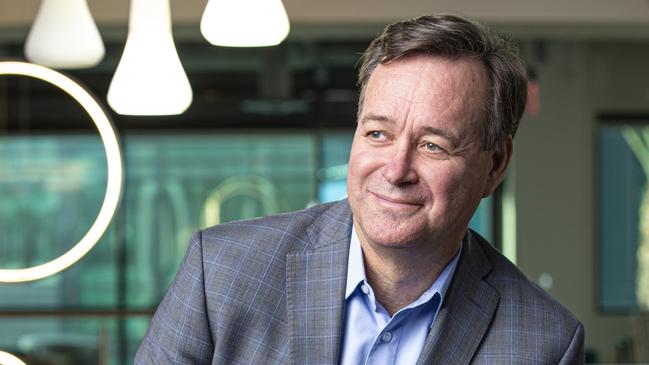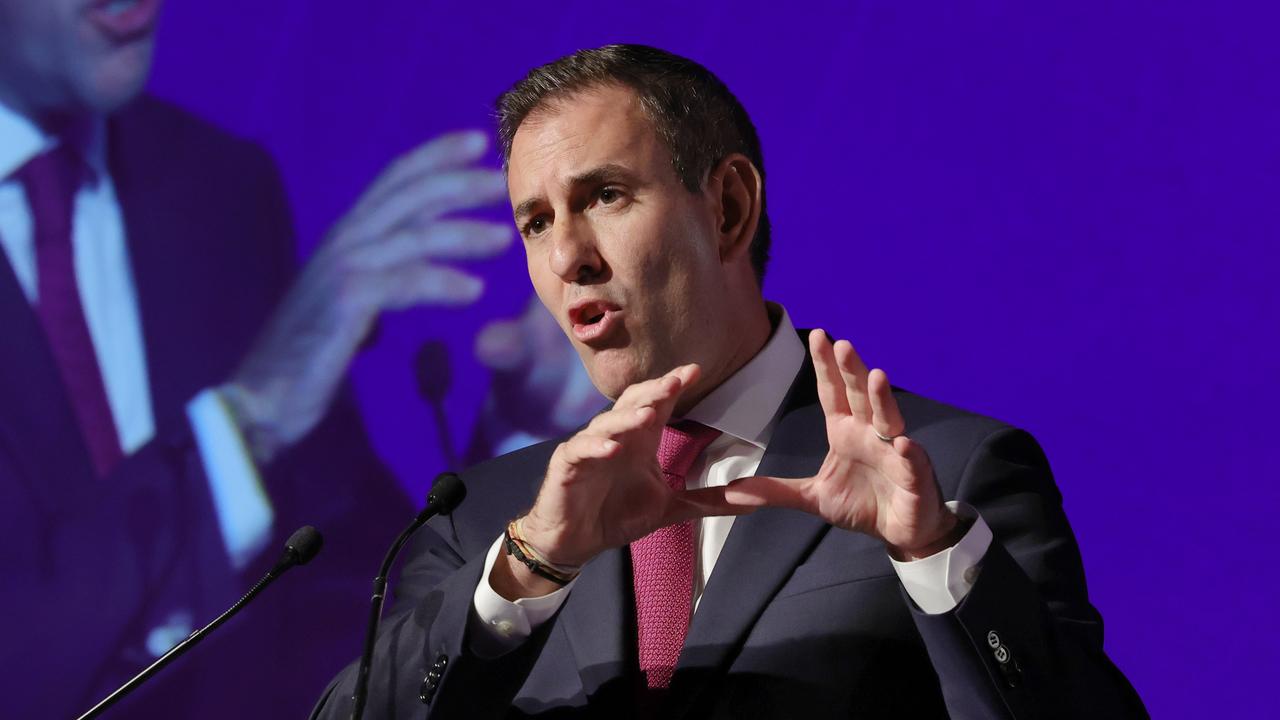How Aristocrat found its $5bn element
The largest deal in the history of Aristocrat Leisure, its $5bn bet on acquiring UK online gambling software and content supplier Playtech, is all about growing in the online world.

The largest deal in the history of Aristocrat Leisure, its $5bn bet on acquiring UK online gambling software and content supplier Playtech, is all about growing in the online world.
Yet in 14 months of secret negotiations, the codenames ascribed to the deal by Aristocrat’s advisers – Goldman Sachs and UBS – had a distinctly earthy feel: The Australian firm was known as “aluminium”, its British target tagged “platinum” and the deal was codenamed “Project Element”.
Before the bankers had their way, Aristocrat chief executive Trevor Croker came up with his own unique moniker for the biggest deal of his life: Project Dewey, named after the Dewey Weber vintage surfboard he bought last year.
It was vintage Croker, a former Foster’s Australia executive and Asia-Pacific sales boss at Beringer Blass Wine Estates, who joined Aristocrat in 2009 before replacing legendary CEO Jamie Odell in 2017.
The affable Croker was a lifesaver on the Gold Coast through his school years and into his early 20s and still loves hitting the waves.
He completed a diploma in Sports Administration at Griffith University and ended up running the Port Douglas Surf Club before being offered a job by CUB, then the club’s sponsor.
He speaks with a broad Aussie accent and prides himself on being down–to–earth, even if his remuneration package is worth over $4m per year.
“When I catch up with my mates, when I catch up with my family, we don’t talk about work. We don’t talk about growth or success or anything like that. We talk about many different things,” Croker says in the first wide–ranging interview of his life.
“You are just a normal person when you’re not at work. I wander around in board shorts and thongs, just like everyone else does. I don’t shave on weekends, because I don’t like it. That’s just who I am.”
It is 8.30pm and the lights of the Las Vegas casino strip flicker behind him as Croker chats over Zoom from Aristocrat’s head office.
He’s only been in America for a few weeks after spending the previous 12 months stuck in Australia due to the Covid pandemic.
He returned to Sydney to release Aristocrat’s annual results in October 2020 and was still there 11 months later as Australia’s international borders slammed shut.
Only for the final negotiations of the Playtech deal did he travel to Las Vegas.
Keeping his family in Sydney – they moved to Santa Monica in 2017 before returning home with him for last year’s results – allowed his two children to complete their school year in Australia.

Croker and wife Jodie now plan a move to Las Vegas in the months ahead – he is also chairman of the American Gaming Association – while their children will likely study in California in 2022.
Croker looks weary after a string of back-to-back investor calls around the world at all hours to explain the Playtech deal. But he is still beaming.
“I feel like a kid with a new toy. I couldn’t be more excited at the moment. The energy is definitely flowing, particularly from our team who have really embraced it. We have a long journey to go before it is approved. But certainly the industry, our customers, our team have just been really great in providing some good feedback.”
Doing the deal
Croker says the first three conversations with Playtech CEO Israeli Mor Weizer, which started in August last year, were about culture.
He also wanted to be assured of Weizer’s appetite for growing the business, which has been a hallmark of Aristocrat in recent years – organically with its investments in research and development, and with well–timed acquisitions.
Croker and his board, led by former SEEK and Virgin Australia chairman Neil Chatfield, also had to navigate the complicated UK takeover regime, given Playtech is listed in London. “We’ve never done a public company transaction in the UK and the climate over there is quite complicated and restrictive. So we had to take our time and also take our board on that journey of how complex and how different this would be to a normal transaction,” he says.
For all its rapid growth in recent years, the fast-growing online real money gaming (RMG) market – including sports betting, i-gaming and i-lotteries – has been a missing piece for Aristocrat.
The $US70bn ($93.6bn) market, well established across the UK, Europe and parts of Asia, has potential to grow strongly in America with the ongoing liberalisation of that market and the huge shift to online gaming.
Croker says he had no concerns about negotiating without face-to-face meetings or seeing physical assets because he views Playtech as a technology business.
Playtech’s board has recommended Aristocrat’s offer and given secured undertakings from investors holding 20.7 per cent of the stock to vote in favour of the deal, which is critical for success.
“To have the largest shareholder and a suite of other shareholders supporting the deal is a vote of confidence. It certainly gives us confidence around pricing and strategic value for what we put on the table,” Croker says.
But mergers fail far more than they succeed. Earlier this year Aoris Investment Management examined 1000 of the largest M&A deals over the past 50 years, with transaction values ranging from $US5bn to $US150bn; 60 per cent failed.
Barrenjoey analyst Matt Ryan said before the deal was announced that Aristocrat was not feeling pressured into M&A and that there were “logical adjacencies” to participate in the liberalisation of US online betting.
Few expected a deal of this size, even though Aristocrat is generating $1bn in free cash per annum.
Croker argues the company has already proven its ability to digest big bites – specifically with its deals to buy social gaming companies Big Fish in 2018 for $US990m and Plarium for $US550m a year earlier.
“Plarium and Big Fish were company-transforming,” he says.
“It’s funny that the value of those two deals as a percentage of enterprise value is actually more than what this current deal is … I can honestly say to you, we believe we can make this absolutely fly. It’s a great business. You merge two leading companies together to make a world-class company.”
Some investors have wondered why this deal, pitched at a 58 per cent price premium, needed to happen now. Croker’s simple response is “Why not?”, pointing to the company’s strong rebound from the Covid horrors with an expected $861m profit for 2021.
“The core business is absolutely on fire. The gaming business is rebounding, the digital businesses are performing very well,” he says, noting Aristocrat is now No.5 globally in the mobile game market. It is actually if not now, when?”
The financial benefits of the deal, he says, will come between 2023 and 2026.
But it also comes with an important catch. Aristocrat plans to offload around $80m of Playtech’s earnings before it even starts the merger integration, quitting parts of the business it says are “inconsistent with its risk appetite and approach to compliance”.
Playtech has betting shops, gaming parlours and online operations in Mexico, Italy and Asia, parts of which are unregulated, a potential ESG nightmare.
Playtech was founded in 1999 by Israeli-Cypriot billionaire Teddy Sagi, who had three years earlier served nine months in prison for fraud and bribery.
Sagi sold 12 per cent of Playtech for almost $400m in 2016 and rest of his stake for $88m in 2018.
Yet Croker actually sees Aristocrat’s high bar of regulatory compliance as a competitive advantage with its key regulator, the Nevada Gaming Control Board.
“We’ve got to do the work in the jurisdictional review, which we said we would do in our offer announcement, but we’ve satisfied ourselves with a number of the jurisdictions to say there is enough structure here and we can be confident with it,” he says.
“Frankly, we will work with regulators to get their confidence that we’re taking a prudent approach to do this. There’s always risk in any deal.”
Certainly the analyst community was in agreement this week that if one Australian company was able to pull off a deal of this size and complexity on the global stage, it would be Aristocrat. Neil Chatfield has previously lamented the lack of appreciation both inside and outside Australia for the company’s success in taking its intellectual property to the world in highly competitive markets.
Undervalued
His CEO agrees that what Aristocrat achieves is too readily understated. That is seen in its market valuation. While perceived at a growth stock, it trades on multiples that are half those of its so–called growth peers.
“I do think this is a company that people look at from an Australian lens, and we don’t get the appreciation in the North American market for the size and the innovation that we bring. That’s maybe about growing up a bit in North America. We’ve come from a challenging position to being in a leaders’ position. Sometimes it takes a while for people to change their mindsets and say that maybe they are the real leader,” he says.
“This will create a perception for us of being the most trusted and valuable gaming and entertainment company in the world.”
They are big words. And rare for Croker.
In his four years as CEO, he has preached a mantra that Aristocrat could be as bold as it likes internally, but always remained humble in the public eye. That extends to his own approach to leadership. It’s one of the reasons that you have never read an extended profile interview on Croker in a major newspaper, until now.
“I’ve always believed that you never call yourself a leader; other people appoint you a leader,” he says. “I’m not one for going out there and saying ‘We’re No.1’, or ‘We’re the biggest.’ If the industry comes out and says you’re a real leader, then that to me is satisfaction and success. Us going out, putting it on a poster and telling people about it, it’s not the way I do things.”
He says listening is an undervalued trait in leadership.
“I like to pride myself on the fact I’ll listen. Listening for perspective, listening for depth and understanding all perspectives. Because in these roles, you can often be pitched to and people are giving you one side of the story, but it’s about making sure that you’re able to listen,” he says.
“Anyone can talk to me about anything at any time, and be able to have that ease of access. I try to be disarming. Just come up and talk to me. Tell me what you think. I might not agree with you, but at least I’ll listen to you and we can have that conversation.”
That extends to his relationship with Neil Chatfield, who he describes as a voice of calm, experience and reason. Those traits came to the fore last year when poker machine venues and casinos had to shut overnight during the Covid pandemic.
Chatfield says Croker is one of the reasons he joined the Aristocrat board in 2017. He was made chairman at the start of 2019.
“He had a vision around the convergence of technology and greater globalisation of the company. That has been proven,” Chatfield says.
“Strategically Trevor is very strong and he is patient but deliberate, which is a really good trait. He has terrific energy. He is also a really humble kind of leader. He is not an attention-seeker.”
Chatfield says the Covid experience highlighted Croker’s focus on his staff. “Almost every discussion we would have would revert back to people. He has a great ambition for his staff. I have been really impressed with the culture he has fostered.”
Croker had to follow in the giant footsteps of Jamie Odell, also a former Foster’s Group executive, who grew Aristocrat from a $2bn to $10bn market value during his eight year term as CEO. Croker was Odell’s first hire at Aristocrat in early 2009.
Where Odell charmed investors with his cult of personality, Croker says in the past four years the perception of the business has gone from “a personality to a team of personalities”.
Perhaps it stems from decades battling the surf, but Croker believes one of his greatest strengths is resilience. It will be a trait needed in spades in the years ahead as the world watches Aristocrat go where it has never dared before.
Tough times, he says, are about “digging in, solving the problem, coming up with a plan and then focusing on getting through that plan and getting out of it.”
He says the infamous collapse of Aristocrat’s Australian business in 2013 inspires him “to make sure this business is never in that situation again”. “That’s why we have to keep focused on growing the business, investing for growth, and then using M&A to accelerate growth,” he says. “Because when you stop and you get complacent, that’s what happens.”




To join the conversation, please log in. Don't have an account? Register
Join the conversation, you are commenting as Logout